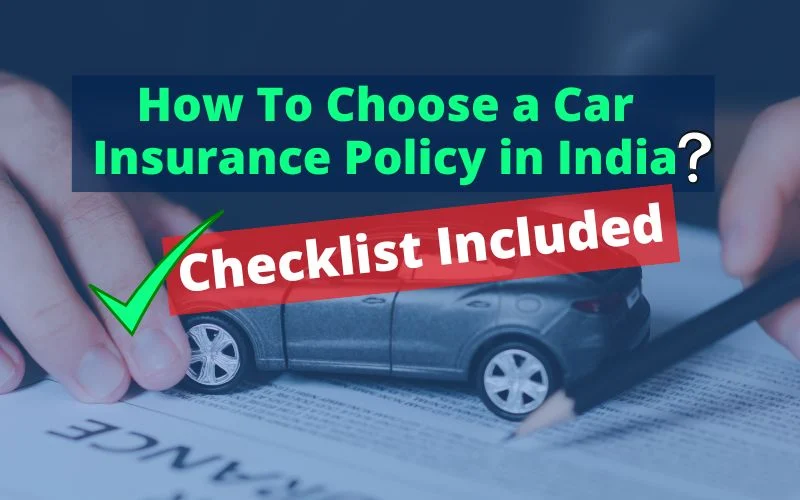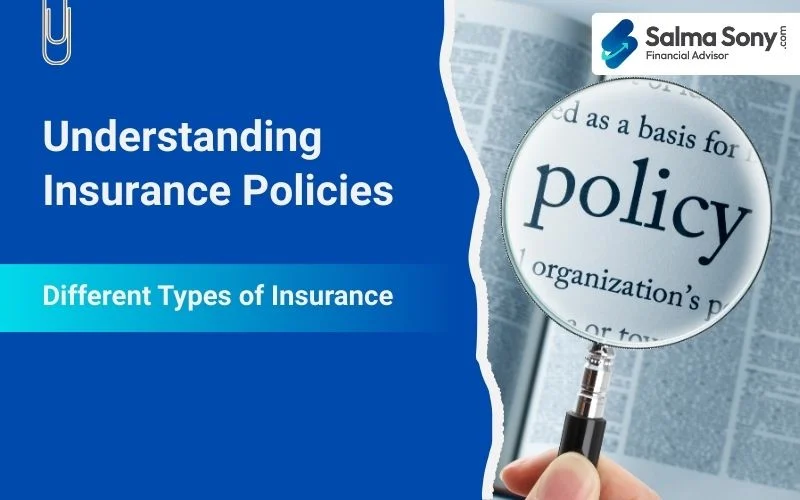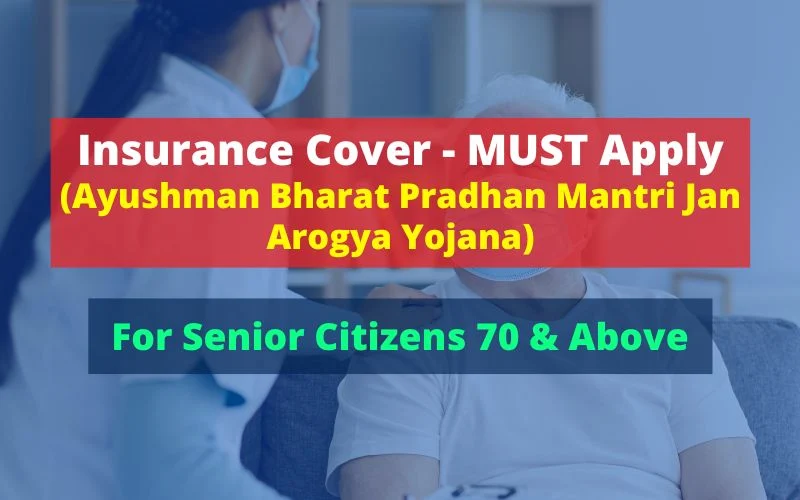Owning a car is no longer a luxury in India but a necessity, and without it, it might become challenging for you to travel to and from your daily lives. Hence, it also becomes essential to protect against any financial risk in case of accident or damage so that your life continues smoothly.
In India, it is mandatory to have third-party liability insurance under the Motor Vehicle Act (MVA) of 1988, which ensures third-party damage is protected in case of any accident or mishap. As the demand for cars has increased, so have the insurance providers and features, and hence, it has become complicated for people to choose the right car insurance plan. In this article, we will learn the factors and the car insurance checklist to consider when buying a car insurance plan to help you make an informed decision.

Understand the Types of Car Insurance
Car Insurance falls under general insurance. There are two types of car insurance in India. Let’s understand the factors and How To Choose a Car Insurance Policy in India.
(i) Third-Party Liability Insurance
As mentioned earlier, third-party liability insurance is a must in India, where people are legally bound to have it the moment they purchase their car; this kind of insurance helps cover third-party liability, which includes human damage, either in the form of injury or, death or property damage. Third-party insurance covers only third-party party damages and does not include any damages to your car.
(ii) Comprehensive Car Insurance
If you love your car and want to protect it from damage, you must go for comprehensive car insurance. Remember, comprehensive car insurance includes both third-party liability and own damage. By having comprehensive car insurance, you are not just protecting yourself from liability towards third parties but also towards the car’s own damage, i.e., if your car comes across any damages or theft, comprehensive car insurance will take care of it.
I highly suggest looking at the different values provided by comprehensive car insurers and opting for the same based on your need to make comprehensive car insurance meaningful.
Understand the Insured Declared Value (IDV)
While looking for car insurance, you must understand and consider the IDV the insurance company provides. IDV stands for insurance declared value, the maximum sum assured (SA) by the insurance company in case of any unfortunate loss.
For example, if you have two insurance options- A & B to be chosen from where all the policy features are precisely the same, including insurance premium, but the IDV of the car insurance Policy A is more than another Policy B, then you must consider Policy A.
How To Choose a Car Insurance Policy: Coverage Options Comparison for Comprehensive Car Insurance
Let us deep dive into different coverage options provided by the insurance companies and which six essential factors you must consider:
Each car insurance policy has a set of coverage options; comparing these options is necessary before purchasing a policy:
(i) Accident Coverage
A good policy will cover damages to your car caused by accidents, regardless of whether you are at fault. Ensure the policy covers damages to your vehicle and the third-party property.
(ii) Natural Disasters
Usually, comprehensive car insurance covers natural calamities and disasters like earthquakes, storms, or floods; while buying car insurance, you must consider that your residing area is prone to which natural disasters, for example- floods, earthquakes, etc., and ensure that your comprehensive car insurance covers those natural calamities to ensure proper safety. However, certain monsoon-related risks may not be adequately covered under natural disasters.
(iii) Theft and Fire
The comprehensive insurance also covers artificial disasters like fire, theft, etc. When choosing a comprehensive insurance plan, ensure these artificial disasters are included.
(iv) Personal Accident Coverage
Having personal accident coverage is mandatory in India. If you are the owner of a car, then you must have personal accident coverage. You can buy a personal accident cover with the comprehensive car insurance policy or separately. If you already have personal accident coverage, you don’t need to purchase it with the car insurance policy.
(v) Roadside Assistance
I believe having roadside assistance is one of the essential features to include in your car insurance policy, especially for all the women who drive; it is a safe bet to take so that a reliable person reaches out for help in case of any breakdown issue.
(vi) Zero Depreciation Cover
A zero depreciation cover is a good feature that works well with high-value cars. Adding zero depreciation cover to your comprehensive insurance coverage will compensate you for the full value of your car’s parts without deducting depreciation.
How To Choose a Car Insurance Policy: Add-Ons to Enhance Coverage
Add-ons are additional features that can be included with a comprehensive car insurance policy to boost your coverage. While including these add-ons, the premium will increase, but it can save you a lot in various situations in case of damage.
Some of the popular add-ons you must consider:
(i) Engine and Gearbox Protection
If you stay in a rainy place or place that often has water logging issues, having engine and gearbox protection is a must. In that case, this add-on protects your car’s engine and gearbox due to water logging, floods, or other circumstances not covered under a standard policy.
(ii) Return to Invoice (RTI)
Return to Invoice (RTI) is a cover that helps you receive compensation when a car is stolen or is beyond repair.
For example, in the unforeseen circumstance where your car is stolen, and the police cannot find the car, it might become tough to come out of such situations; that’s where the return to invoice (RTI) add-on option comes into play. In this case, you can sit and relax, and if the car is not found, you can claim the car’s total value, which is the original value you paid when buying the car.
Nowadays, some insurance companies also give the option to opt for the car value at the purchase return to invoice (RTI); this add-on feature can be a big relief if you stay in a city where you often come across a car getting stolen.
(iii) No Claim Bonus (NCB) Protection
No Claim Bonus (NCB) Protection add-on helps you protect no claim bonus even if you make the claim. If you are a careful driver and give your best while driving, ensuring no damage and no claim, you can avoid taking no-claim bonus protection.
(iv) Tyre and Rim Protection
Tyre and Rim Protection add-on can be helpful if you often go for a long drive / drive a lot. By adding this add-on, you can protect against damages to your car’s tires and rim, usually not covered by standard policy.
Must Read below article related to insurance 💡
Checklist to Consider for the Best Car Insurance Policy
1. Check the Claim Settlement Ratio (CSR)
The Claim Settlement Ratio (CSR) indicates the insurance company’s reliability in settling claims. A higher CSR means the company has a better track record of successfully processing claims, and you are more likely to get a smooth and timely claim settlement.
Before purchasing a car insurance policy, check the insurer’s CSR to ensure they have a strong reputation for claim resolution. CSR data is found on the Insurance Regulatory and Development Authority of India (IRDAI) website.
2. Analyze the Premium Costs
For Indians, the insurance premium is one of the most significant factors when choosing a car insurance policy. While it is tempting to opt for the cheapest premium policy, remember that it will be ideal to consider a balanced premium considering the coverage offered. It is essential to get sufficient coverage while keeping your budget in mind.
3. Research the Insurer’s Customer Service
Choosing an insurer with good customer service is vital to ensure a smooth experience during the policy tenure. Look for an insurance company that offers 24/7 customer support, a strong nationwide presence, and an easy claims process.
4. Read the Policy Carefully
Before finalizing your car insurance policy, carefully read the exclusions, limitations, and clauses that may affect your claims in the future. Some standard exclusions in car insurance policies include intentional damage, damage during drink and drive, and damage by unlicensed drivers. Understanding these exclusions can help you avoid unpleasant surprises during the claims process.
5. Compare Policies from 2-3 Insurers
Once you know the coverage you need, compare policies from at least 2-3 different insurance companies. Check terms and conditions and customer reviews apart from CSR (Claim Settlement Ratio) to select the best insurer.
6. Go for Online Purchase
Buying a policy online is very convenient and saves you money, too, as many insurers offer discounts when you purchase a car insurance policy online.
Conclusion
Choosing the right car insurance policy in India requires a thorough understanding of your needs, the available coverage options, and the financial implications of the policy.
By carefully assessing factors like the IDV, coverage, premiums, and the insurer’s reputation, you can make an informed choice that safeguards you and your vehicle. Compare policies from at least 2-3 insurers, consider optional add-ons for extra protection, and review the terms and conditions to ensure you secure the best coverage for your car; likewise, if you want to plan your finances in the best possible way, you must consider financial planning.





